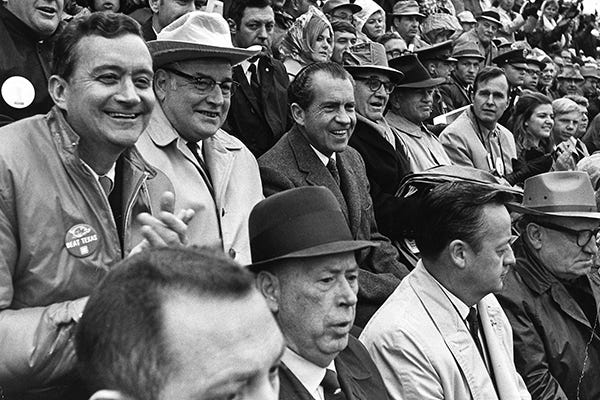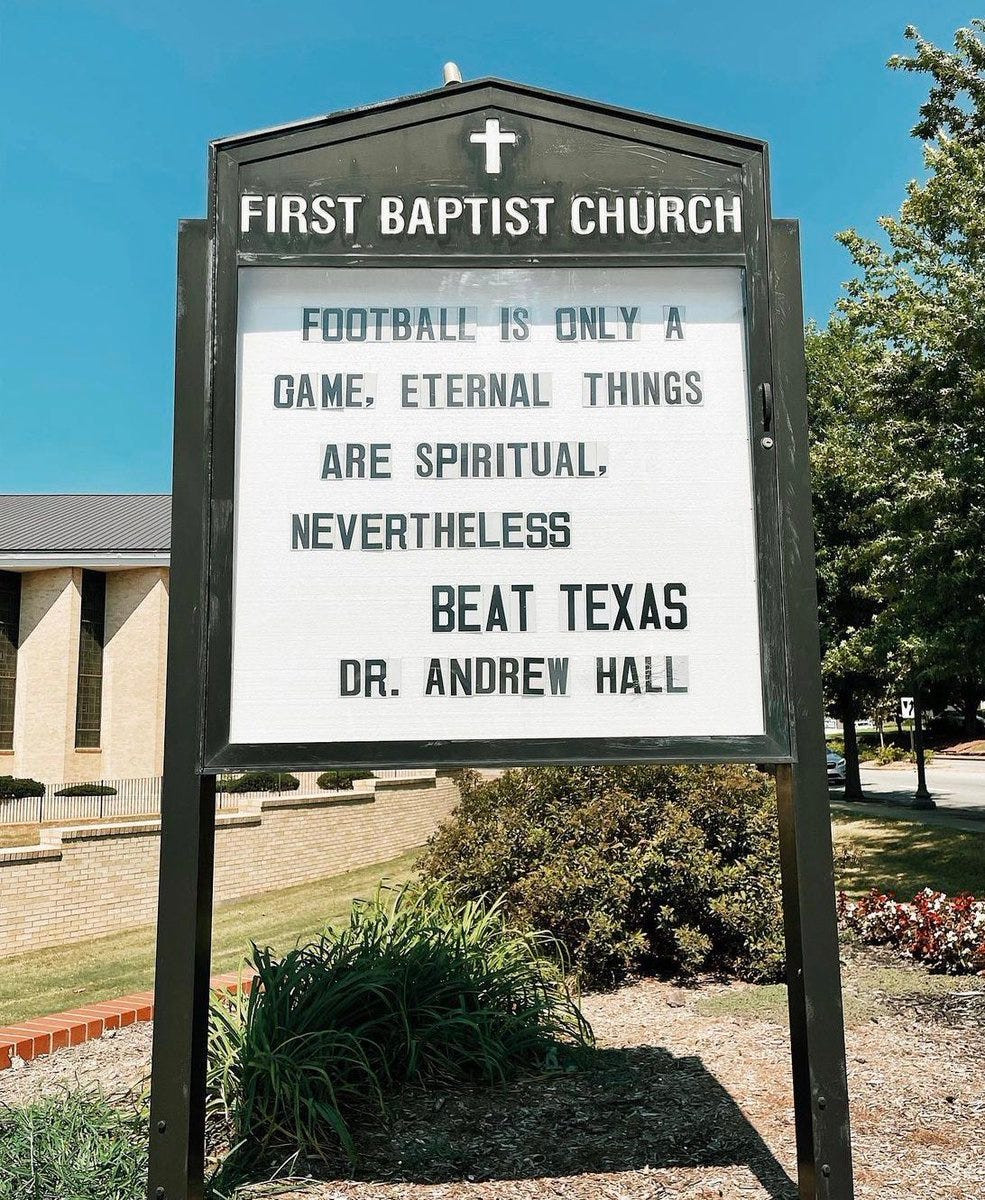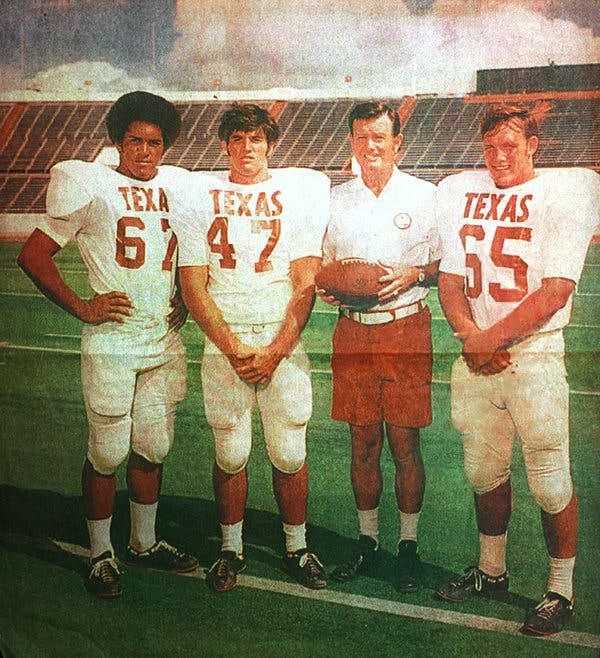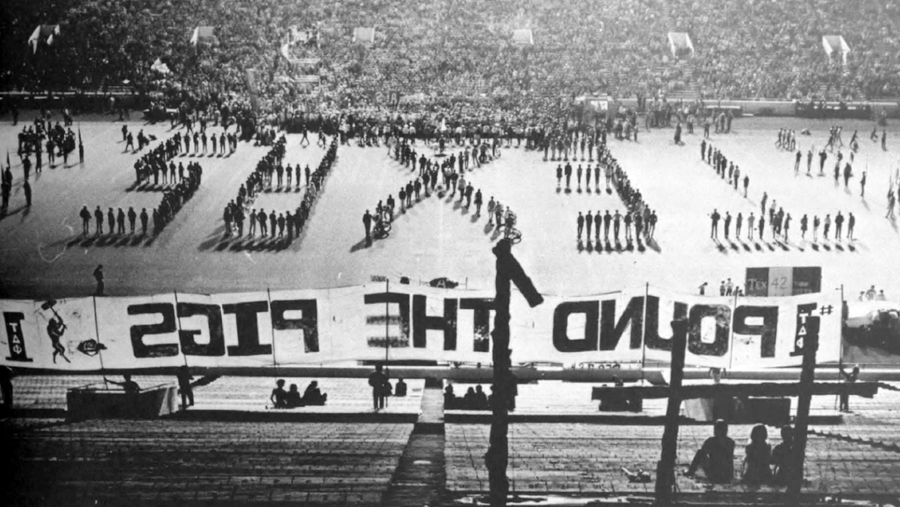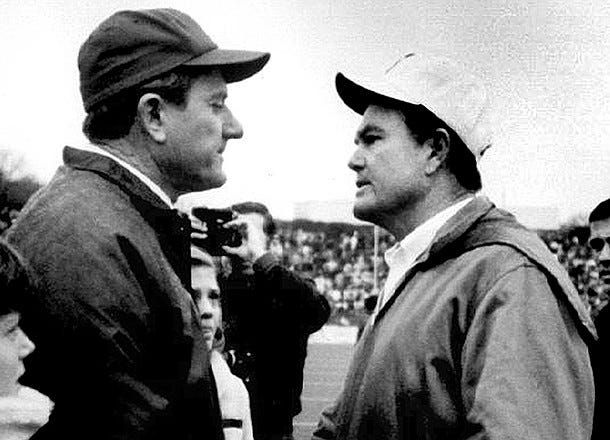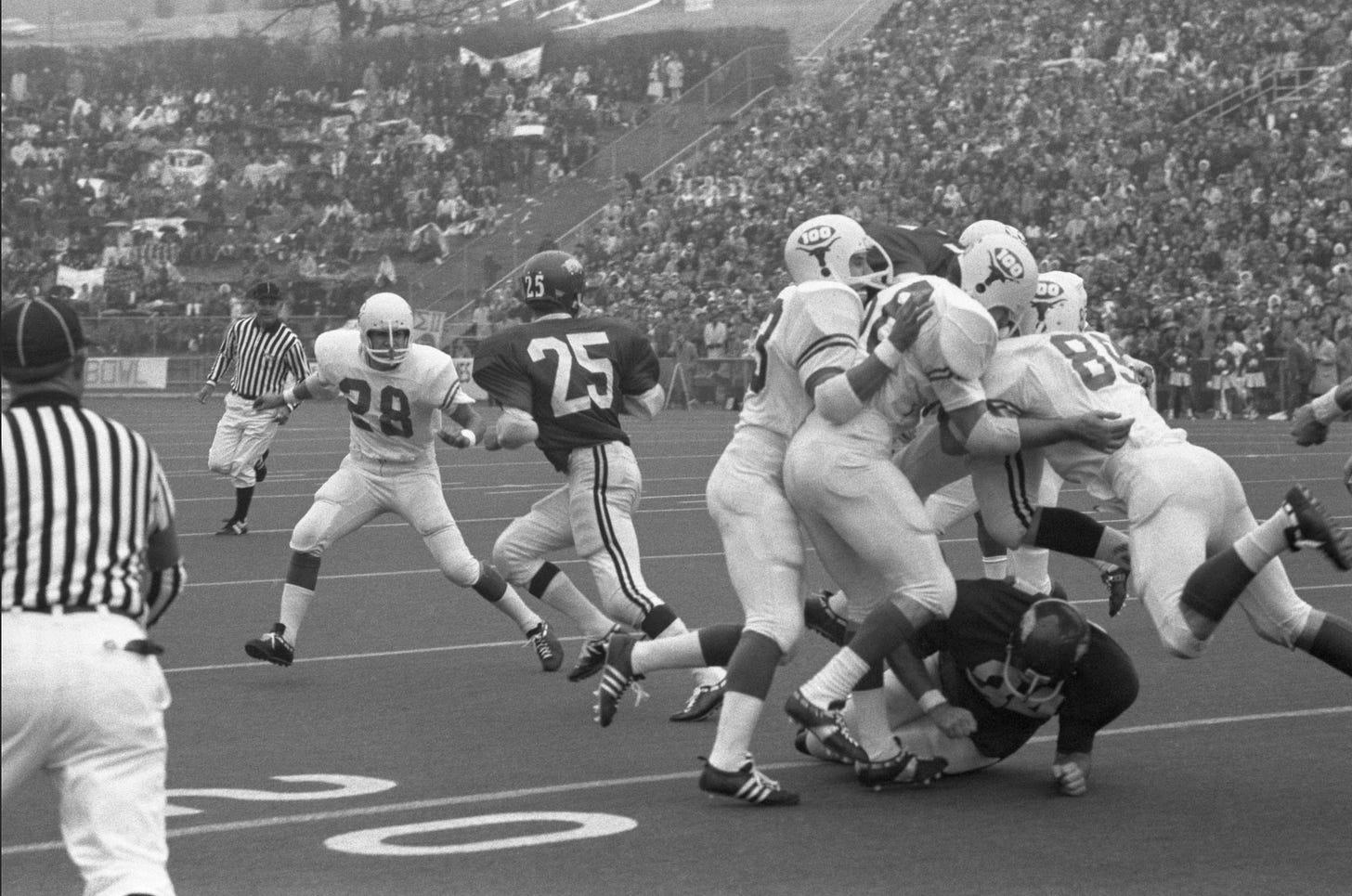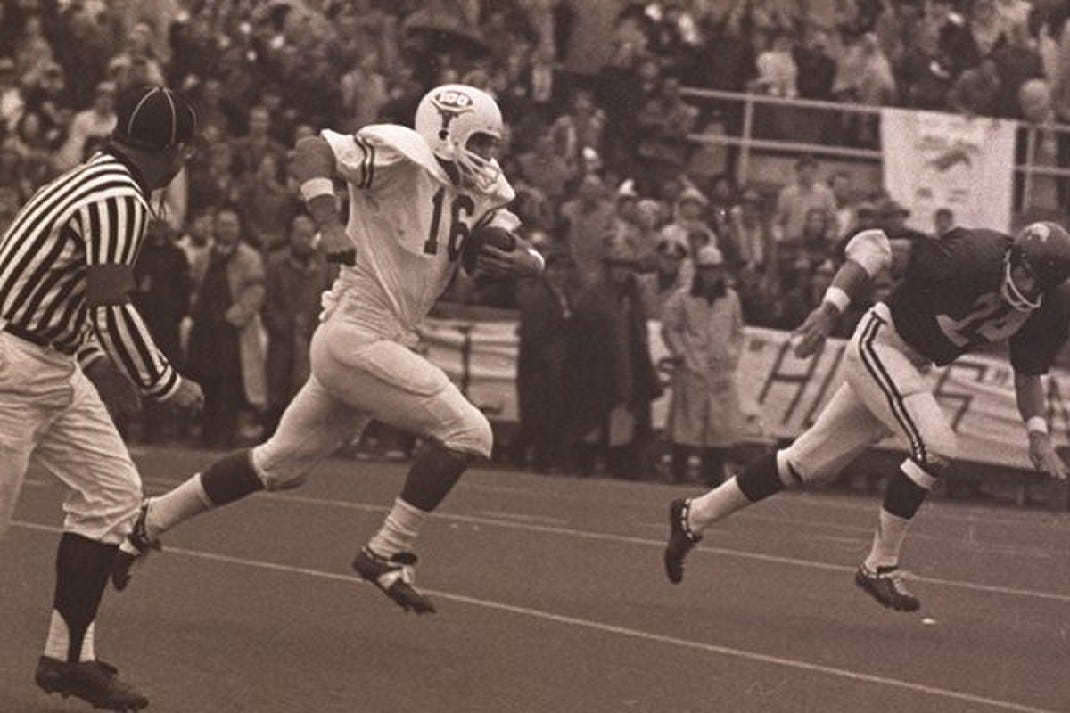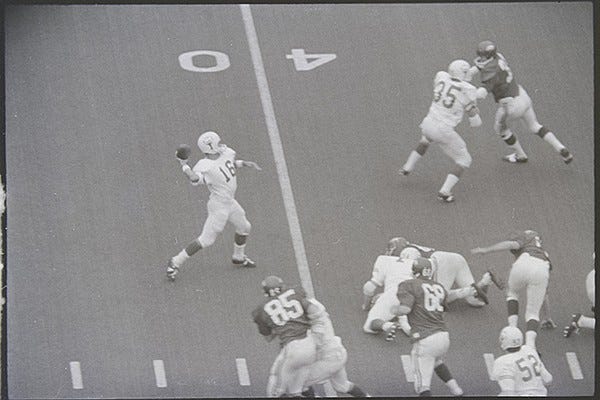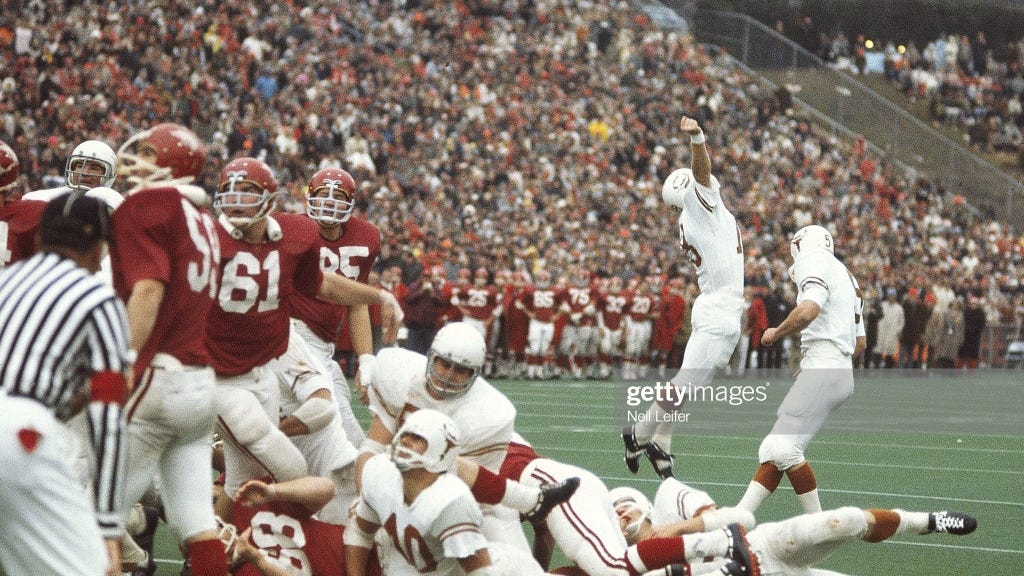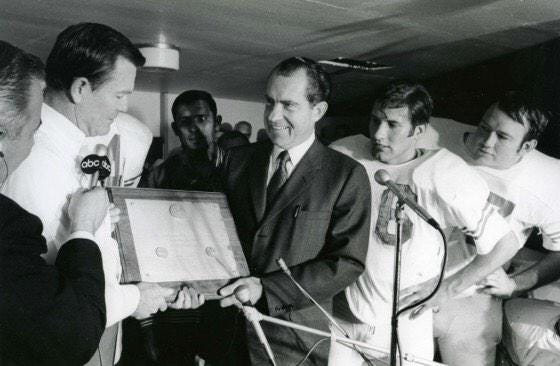The Purists Will Have a Field Day
The 1969 "Big Shootout" between Texas and Arkansas left an indelible mark on college football. Here are stories from fans and players who remember it.
“The purists will have a field day today.”
The Big Shootout between Arkansas and Texas in 1969 was the pinnacle of a century of football. It decided a Southwest Conference title, a national championship and created legends that live on more than half a century later. The game served as the fireworks for football’s centennial celebration in America. When you look at it now, it seems both timeless and archaic in the same frame.
The game was moved from the teams’ usual October matchup to the first weekend of December to take advantage of the TV ratings and the drama. The hype for the game exploded after #1 Ohio State lost to Michigan the Saturday before, a sentence that seems straight from fiction now. The National Championship was on the line and a President would coronate the winner in Fayetteville. The great Dan Jenkins wrote that the mania for the game grew “like a strawberry rash” and painted it as Fayetteville’s “climax of a week-long metamorphosis – from the nation’s No. 2 chicken producer to its sports capital.” Jenkins then tells of the emotional toil it took on the fans, “as one fellow modestly put it early in the week, if the damn game don’t hurry up and get here, I’m gone keel myself.”
Northwest Arkansas businesses answered the phone with “Beat Texas” as their greeting. God infamously got involved, much to Darrell Royal’s surprise: “I thought God was neutral.” UT hosted a pep rally of over thirty thousand people in Austin to see the team off on Thursday night. Of the television sets that were on in America on that December Saturday, more than half were watching Texas and Arkansas play football in front of Richard Nixon. Then in a rare feat in life, the result lived up to the hype. The game was the capstone to 100 years of football and years from now, it will still be talked about in football’s 200th year.
In trying to write about this game, I think about the Spanish Conquistadors staring out onto the Llano Estacado for the first time and thinking the south plains were oceanic, unconquerable. I feel the same way trying to wrap my head around this game. You can’t do it justice with any one piece of writing. There are so many angles you can take with the story of Texas/Arkansas. You see why this game has inspired movies, documentaries, numerous books and a lifetime of personal stories. There’s the friendship and rivalry between Darrell Royal and Arkansas’ Frank Broyles. The game itself was legendary, but you could even write tens of thousands of words about specific plays: 53 Veer Pass just being one of them. There are the contrasting styles of Royal and Emory Bellard’s Wishbone with Arkansas’ liberal passing attack that’s still impressive today. There’s Nixon’s presence, what Dan Jenkins focused on in “The President’s Game of the Decade” in the book Saturday’s America. There’s Freddie Steinmark, who heroically played through the pain of cancer days before his leg was amputated. On the one hand, the game served as a respite at the end of a brutal time in America that saw MLK and Robert Kennedy assassinated. On the other, there’s the unfortunate truth that this was the last national championship game between two all-white teams. Texas will always have the sad title as the last non-integrated national champion. The team would become integrated the next year as Julius Whittier joined the varsity team. Less than a decade later, Earl Campbell would hoist The Heisman Trophy.1
I’ve heard about two football games that occurred before my birth more than any others. The first was a thrilling 1962 playoff game between the Winters Blizzards and the Denver City Mustangs. Though it wasn’t lacking in drama, it contained considerably less fanfare and one less President in the audience. ICYMI: Steve Grissom improbably kept his balance on the way to the endzone and the Blizzards moved on to the semifinals, where heartbreak awaited. The next most discussed is the Texas/Arkansas game, which was my mom’s freshman year at Texas. Moving to Austin from Sinton Texas and seeing your team march to an undefeated national championship in your first year of college will leave an imprint on your life. Games like these leave indelible marks on those who saw them and the players who played in them. It’s a remember-where-you-were, what-you-were-wearing and what-you-cursed type of game. These games carry memories people can never forget or can’t escape. Instead of trying to recap the epic showdown in Fayetteville once more, I was fortunate enough to talk with some people who are still thinking about it today. We’ll let their memories be the story for today.
THE BUILDUP
Ann Gore (Freshman in 1969, from Sinton, TX): Strange things happened to make my freshman year so difficult, the Registrar’s Office failed to send my registration packet, my dorm burned down. However, the bright spot and one of my favorite parts of my entire college experience was, of course, football. I saw my first football game at age 5, and it was love at first sight. So, the 1969 national championship season was an unforgettable experience. In early December, the Longhorns were undefeated and headed into the final regular-season game with DKR as the coach, the unstoppable wishbone offense and James Street as our incredible quarterback.
John Morrow (Dallas TX): I was just 14, but I remember it well. In the previous 10 years, UT and Arkansas had won or shared conference title 8 times. Interesting fact that the game was originally set for its traditional October date, but ABC convinced both teams to move it to last week of the season for TV.
Tom Campbell (Defensive Back, son of DC Mike Campbell): I probably occasionally started thinking about the game with Arkansas the week after we beat Oklahoma (27-17). The coaches didn’t talk about Arkansas. Ohio State was #1, we were #2 and Arkansas was #3 and the expectation was Ohio State would win the national championship again. But, I knew it was going to be huge when I heard on the radio that Michigan beat Ohio State, it took on a new meaning.
Charles Tips (Junior in 1969, Lewisville, TX): I don't think there was ever a game bigger than Arkansas (#2) vs Texas (#1) in 1969. It was the 100th year of college football, and broadcaster ABC had the foresight to move the game back to Dec. 6, after the rest of college football was over and done with. Still, defending national champion Ohio State under legendary jerk coach Woody Hayes was atop the polls... until the Michigan Wolverines under cocky new coach Bo Schembechler, a former Hayes assistant at OSU, upset the Buckeyes, upset them the Saturday before Texas played A&M on Thanksgiving. Suddenly, the way to a National Championship was open! The media frenzy for the game exploded after the OSU loss.
Bruce Anderson (Texas Cowboys, Junior in 1969, Austin, TX): Texas tried to get the game moved to War Memorial Stadium in Little Rock because it held more folks, but no deal. This was a huge deal to the state of Arkansas. Texas had beaten an undefeated Arkansas team in Austin the year before (39-29) and this was payback time for them.
Gary Griffith (Silver Spurs, 1969): We had three Sig Ep fraternity brothers starting that game so several of us decided to go Fayetteville. Everyone lined up at Gregory Gym to draw 6 tickets on our student "Blanket Tax” early that week. Several of us spent the night (maybe two nights) in line on steps of the gym because the line had grown to several thousand people winding down the street. We were at the front of the line, sleeping bags and all, when the ticket windows opened. A rumor spread through the line that Ark had given Texas only 250 student tickets. I think that morning 40 or 50 of us got our 6-ticket draw, leaving several thousand disappointed students that morning.
Ann Gore: Unfortunately, it was in Arkansas, and the University of Arkansas and its fans were so rabid, they allowed only 400 tickets to be made available to UT. Those UT fans who did try to go to the game were met with an inhospitable welcome, the likes of which we've never seen before or since. There were many places in Arkansas where the UT fans weren't allowed to buy gas or food.
Bruce Anderson: Texas Cowboys were advised not to wear any gear and they obviously didn’t allow Bevo or the Cannon on the field. They tried to shout down or have the Arkansas band play over the Texas band. For the most part there was no gas or food available to Texas fans.
Steve Worster: The president being there. Did it impact the game? No, it didn’t matter.
Tom Campbell: It was fun to know that the President was coming to the game and things kept building. Then we had that huge pep-rally. The game just kept getting bigger and bigger.
Steve Worster (All American Fullback, Bridge City): When we got to Arkansas, their fans went crazy everywhere. I mean they were just nutcases. Screaming and hollering, it was amazing. I mean they were driving up and down the highways the night before the game, honking and hollering, I remember thinking, God, these people are nutcases.
Tom Campbell: The drive to the stadium got crazy, I’m looking out the window of the bus and the Arkansas fans knew our bus and let me tell you they were into it. They were hollering and screaming, oh yeah.
Bruce Anderson: Worster and I were good friends and I asked him about the game that next week when he was at the fraternity house for a party. He said it was the worst behaving crowd he ever played in front of and that he never took off his helmet from the time he left the bus.
Steve Worster: Coach Royal was coaching against one of his best friends, there was a lot of hoopla about that. But, Coach was laid back his entire life. He took everything one step at a time, and you know, he was really calm about everything and I think our whole team related to him. It helped us a lot, a whole lot.
Ann Gore: The build-up to the game was phenomenal. Even in the era of no social media, the hype prior to that game was unlike anything I'd ever seen. We were all in a frenzy of nerves by kick-off.
Bill Little (Texas Sports Information Director): The game was never a social statement. It was about kids who played a game...about the courage of a young man named Freddie Steinmark, who was dying of cancer, and it was about giving America a rare showcase of a game that, when we needed it the most, allowed the nation to feel good.
Steve Worster: We knew it was gonna be a real knock-down, drag-out show.
THE START
Bruce Anderson: Texas’ offense had scored once every 13 plays, but Arkansas’ defense only gave up a score once every 105 plays. As the announcer said, something had to give. The network also said it was a “storybook setting,” but the weather proved otherwise.
Thomas (Longhorn Band, Seguin TX): I was AT the game that miserable-wonderful day. The band uniforms being what they were, we were cold and wet the whole game.
Ann Gore: Billy Graham did the invocation and asked that there be sportsmanship. I’m not sure many Arkansas fans took that to heart. He prayed people be re-dedicated to God. I know a lot of prayers were said that day. God was certainly entertained.
Gary Griffith: At the game we were on Row 1 in the end zone. Arkansas did its best to spread students out to make it difficult to yell and cheer. Mid-way through the first quarter someone seated higher up started hurling water-soaked toilet paper rolls at us on first row. I wore my Silver Spur shirt, even though we didn’t take BEVO, so I was an easy target. I walked over to the Arkansas State Trooper who was leaning on the fence watching the game and tapped him on the arm to ask for assistance in stopping it. He turned around, wearing a red, plastic Razorback mascot hat, grinned and said, “You Texas fans better be careful today.”
Tom Campbell: They were our big rival back then, them and Oklahoma, but there wasn’t any reason for us to feel nervous about the game, we’d beat them the year before. We had an awful lot of good players and we felt confident we were gonna win the game.
Ann Gore: Ted Koy fumbled on the second play of the game right as Nixon was getting to his seat in the crowd and I wanted to pass out. Arkansas scored right after that.
Tom Campbell: Arkansas had a really good defensive scheme to stop The Wishbone.
Steve Worster: I don’t really know what led to the slow start other than we just didn’t play well. Well, that and that they were a hellacious football team.
Tom Campbell: Here’s what Arkansas did that no one talks about. They put two wide-outs on the same side. A split end and a split flanker. I was always covering the widest receiver, so who was on their All-American split-end Chuck Dicus on the inside? Well, that’d be my brother Mike, our outside linebacker. Right off the bat it wasn’t going well.
John Morrow: The Longhorns did not play a great game. Weather was cold and rainy, there were several turnovers early.
Charles Tips: Watching the game was excruciating as Texas could not get traction in rainy, foggy December weather.
Thomas – Longhorn Band: The tension was unbelievable the first three quarters as our team turned the ball over again and again.
Tom Campbell: In those days we were told never to talk to the referees. Well, Dicus scores in the second quarter to make it 13-0. But, while the ball was in the air, John Rees had reached out his arms and touched the palms of my hands, my arms fully extended. I’m running towards the endzone and I notice the referee is looking at me. A lightbulb goes off in my head because the referee is still staring at me, almost asking me to say something, so I say “ref, that’s offensive pass interference.” The ref says you’re right and lays the flag on the ground. 15-yard penalty, then Bill Atessis has a huge sack. They have to punt right after they should’ve been up two scores. That penalty was the biggest play of the game.
Ann Gore: We were lucky to go into the half only down 7-0.
THE RALLY
Tom Campbell: In the third they finally do go up 14-0 and they’re making big plays to Dicus. My dad grabbed my brother Mike as we’re coming off the field and said Mike, you gotta get closer to Number 20. Well, Mike looked at him and said “Daddy, I’m as close to Number 20 as I’m gonna get, but I can cover him in my zone.” So, my Dad felt like we needed to switch to a zone defense. We stayed in the zone defense for the rest of the game. And they didn’t score another point.
Charles Tips: The ABC camera crew had already famously voted Texas QB James Street the most difficult of all time to follow in the viewfinder. He was not considered that talented of a quarterback and would not have been starting if star QB Bill Bradley had had bigger hands and could run the Wishbone as well as Street. But he was competitive, cagy and clever.
John Morrow: The Horns did little offensively until the fourth quarter when Street scrambled on a broken play for a long TD run on first play of the 4th Q. That got us going.
Bruce Anderson: Royal went for two after that. He’d learned a lesson early on in his career to go for two on the first touchdown if you need to score twice to win. But, then Arkansas drove down the field and almost scored right after we finally got going.
Tom Campbell: Freddy was in pain and they took him out. I looked at his backup in the huddle who was nervous as heck and said “what are you doing in here?” He said, I don’t know, Coaches just told me to come in.
Ann Gore: It’s the only time I’ve ever lost my voice watching a game at home.
Tom Campbell: The defense made big play after big play. We weren’t scared. They were about to score again, but we weren’t gonna let them. Our plan was to make them kick and then block the field goal. But, Danny Lester had a huge interception on third down in the endzone to stop them from scoring at all. To this day I don’t know why in the world they passed on third down.
THE LEGEND: 53 VEER PASS
Tom Campbell: I realized it was fourth down and I couldn’t watch. It was like watching a scary movie. It was like watching the Texas Chainsaw Massacre.It was too scary to watch the damn play.
Bruce Anderson: That was courage, that play call.
Thomas - Longhorn Band: Street to Peschel on that 4th down had our hearts in our throats, but Randy came down with that ball.
Ann Gore: Time stopped when the ball was in the air. You'll know from reading about Royal and the Wishbone offense that he didn't like to pass. There's that famous quote of his about "only three things can happen when you pass, and two of them are bad." So, when Street's pass to Randy Peschel was complete, it was utter pandemonium in the living room.
Charles Tips: Royal called for the famous long pass to tight end Randy Peschel, but in a little ruse I only found out about in the Daily Texan sports newsroom the next week, Street pointed and talked toward Texas star receiver Cotton Speyer while calling the play to Peschel. Sure enough, the Razorback defense was spying on the huddle, double-teamed Speyer and Peschel was open forty yards down the sideline.
Tom Campbell: I just knew Street had completed a long pass to Peschel, we still had a shot. I’m not watching the game. We still had to score.
Bruce Anderson: Jim Bertelsen scored right after and the life was sucked from that stadium.
John Morrow: We were lucky to prevail. The Hog fans still have a lot of hate for the Longhorns after that.
Tom Campbell: The crowd was quiet, but we were making a hell of a lot of noise on the sideline.
Ann Gore: As those last seconds ticked away, I think I stopped breathing.
Steve Worster (on what led to the rally): We never got down, we just carried on like we always did.
THE AFTERMATH
Bruce Anderson: Tom Campbell came up with a big interception on the sideline to seal the deal.
Tom Campbell: I’m not lying, I had the most boring football game of my career. They were not going to throw the ball to John Rees on the sideline. But, an important thing happened two plays before the interception that wouldn’t show up on any game film. They were moving the ball down the field near the 50-yard line, trying to get into field goal range. Then their quarterback, Bill Montgomery, loses his shoe being tackled on a roll out. He’s sitting there with his shoe in his hand. You don’t get an equipment time out, so Bill Montgomery has to call their last timeout. All game long their first downs came from throwing the ball to Dicus over the middle, now they couldn’t throw over the middle for fear of the clock running out. To this day, my brother Mike is still agitated that Montgomery didn’t throw the ball to the middle of the field because he finally had Dicus covered. After I intercepted the pass, I sprinted off the field and ran right through the Arkansas’ cheerleaders.
Steve Worster: We didn’t really overdo it. We didn’t get over-excited. We just kind of lined out and went in there and played football. And we wanted to kick their butt, and we did.
Ann Gore: Until right now, I don't think I've ever thought about what would have happened had we not won. I guess we all would have simply keeled over. I have seldom felt that kind of sheer joy when the final second ended.
Tom Campbell: Everyone was out of breath; we were so excited. It was so quiet in that stadium, they were all thinking “how did we lose that football game?”
Steve Worster: In the locker room, it was quite the hoe-down.
Thomas - Longhorn Band: When we intercepted the last pass and had only to run out the clock, you’ll see LHB hats start turning and looking up into the stands. That was us looking to see what was making all that busting glass noise. Enough of us would see objects, glass bottles, ice-filled cups, seat cushions and rental chairs flying down from the upper seats towards us. My brother still has the seat cushion he caught on its way down.
Steve Worster: We depended on each other. We were really solid as a good football team, believing in each other, and it worked out really well with us that way.
Gary Griffith: I remember walking through the parking lot noticing all cars with Texas license plates had their radio antenna snapped off.
Thomas - Longhorn Band: The LHB was stuck on those risers at the edge of the stadium wall, well within range of the drunks throwing stuff. We quickly formed up like a Roman Legion Block, moved the girls into the middle and passed all the Stetson hats to the middle. We took the Big Flag poles, those 1 ¼” wooden closet rods, rolled the flags on them and held them horizontal at our waists, forming a barrier to anyone trying to get at us. Lots of the brass pulled our mouthpieces and held them like brass knuckles in case we were attacked. Our plan was to punch for the face of the attacker. We were finally allowed to march out of the stadium to the buses where one person would watch another’s back while another packed and loaded instruments. We finally collapsed into our seats on the buses, completely emotionally spent. The ride to McAllister Oklahoma was one of the quietest I remember.
Gary Griffith: We had been invited that morning to dinner at the Arkansas Sig-Ep House after the game. They had been highly confident of a victory. The game was over around 4pm and our victorious group started walking towards the House as invited. The chapter president met us on the porch and said “We changed plans and we’ll serve you dinner now, because we are sure you’ll want to leave town pretty quick.”
Tom Campbell: We were used to Presidents being in our locker room because LBJ would come into our locker room after games in Austin, but having President Nixon in there made it even more exciting.
Steve Worster: You know, it was kind of cool, to be visiting with the President. I mean when he came by, he introduced himself to all of us. You know, we said hello, and he would sit down with us for a minute. But, at that point in time, he was secondary. We had just won it all.
Bruce Anderson: They never recovered the plaque that Nixon gave the team.
Bill Little: I was the assistant sports information director at Texas when we played Arkansas. As such, I was the “pool” reporter in the UT dressing room when President Nixon came in and addressed the team. Other than the ABC cameras and Bill Fleming, I was the only journalist in the room. Many books have been written, and films made, about that game.
Ann Gore: I'll never forget the following Monday either. While riding a shuttle bus to class, we saw James Street walking along the sidewalk heading to class. James Street! The guy who engineered a national-championship-winning drive and had met the President of the United States on the previous Saturday. Everyone in the bus rushed to the right-side windows (I thought we actually might turn over) and started yelling and waving to him. Street smiled a very embarrassed smile, waved, and jogged on up the steps to class.
Tom Campbell: It was 30/35 years later and I’m at an alumni event in San Antonio with James Street and everyone wants to talk to him about 53 Veer Pass and the long run for the touchdown. They finally ask me if I’d like to say something and I say you know what, it’s been 35 years so yes, I do. I get up there and I say: you want to know how we won that game? James, how many interceptions did you throw that day? Was it 5 or was it 6, James? How many fumbles did our offense lose that day, James? Was it 4 or was it 5? We beat the number 2 team in the country by playing the best defense a Texas team has ever played. James is out there laughing, but on the drive back he said “if it wasn’t for the defense there’s no way we win that football game.”
Gary Griffith: I had one unused ticket for the game which I have kept for a souvenir. About 10 years ago I attended an Alzheimer's benefit here in Dallas where Frank Broyles was keynoting. I took my December 6, 1969 ticket to the event and asked him to sign it, which he did graciously. Standing with me was Tom Campbell who said, "I’ll see Coach Royal for lunch this week why don’t I ask him to sign it next to Coach Broyles?” I got the game ticket back about 10 days later in the mail with a note from Tom saying,” I took the liberty of asking a few other guys at lunch to sign it. I hope that was OK.” Signing with Coach Royal were Tom and Mike Campbell, Peschel, Arledge, Dale, Street, and Koy.
Tom Campbell: I’ve been riding this wave for over 50 years. It’s been more than 50 years and people still know who I am.I guess the message is, if you’re going to intercept a pass, wait until the last minute of the national championship game so people never forget you.*
Thomas - Longhorn Band: Yeah, I was there. I still get goose bumps just thinking about it, over 50 years later.
Ann Gore: For a small-town girl who loved football, this was my indoctrination into college football, and perhaps it explains why the expectations of almost an entire generation of UT fans are so unrealistic. When you start out winning it all, it's hard to accept anything less. We went on to defeat Notre Dame in the Cotton Bowl and cement the No. 1 ranking. And all of it was set against the tragic backstory of Freddie Steinmark’s diagnosis. Denny Lester died tragically a few years later too. You can't make this stuff up.
Steve Worster: I think it was more important to the fans than it was to us. They’ve probably gotten more out of it than we did, which is great.
Tom Campbell: It was a once-in-many-lifetimes thing to happen.
Steve Worster: Let’s just say it meant everything, and it was, it was weird, in a lot of different ways.
**Thank you to Tom Campbell, Steve Worster, Bill Little, Gary Griffith, Bruce Anderson, Ann Gore Young, John Morrow, Charles Tips, and Thomas of the Longhorn Alumni Traveling Band.
For those of you looking to read more on Texas’ racial history and its integration of athletics, I’d highly recommend Yards After Contact (an Earl Campbell biography) by Asher Price.




